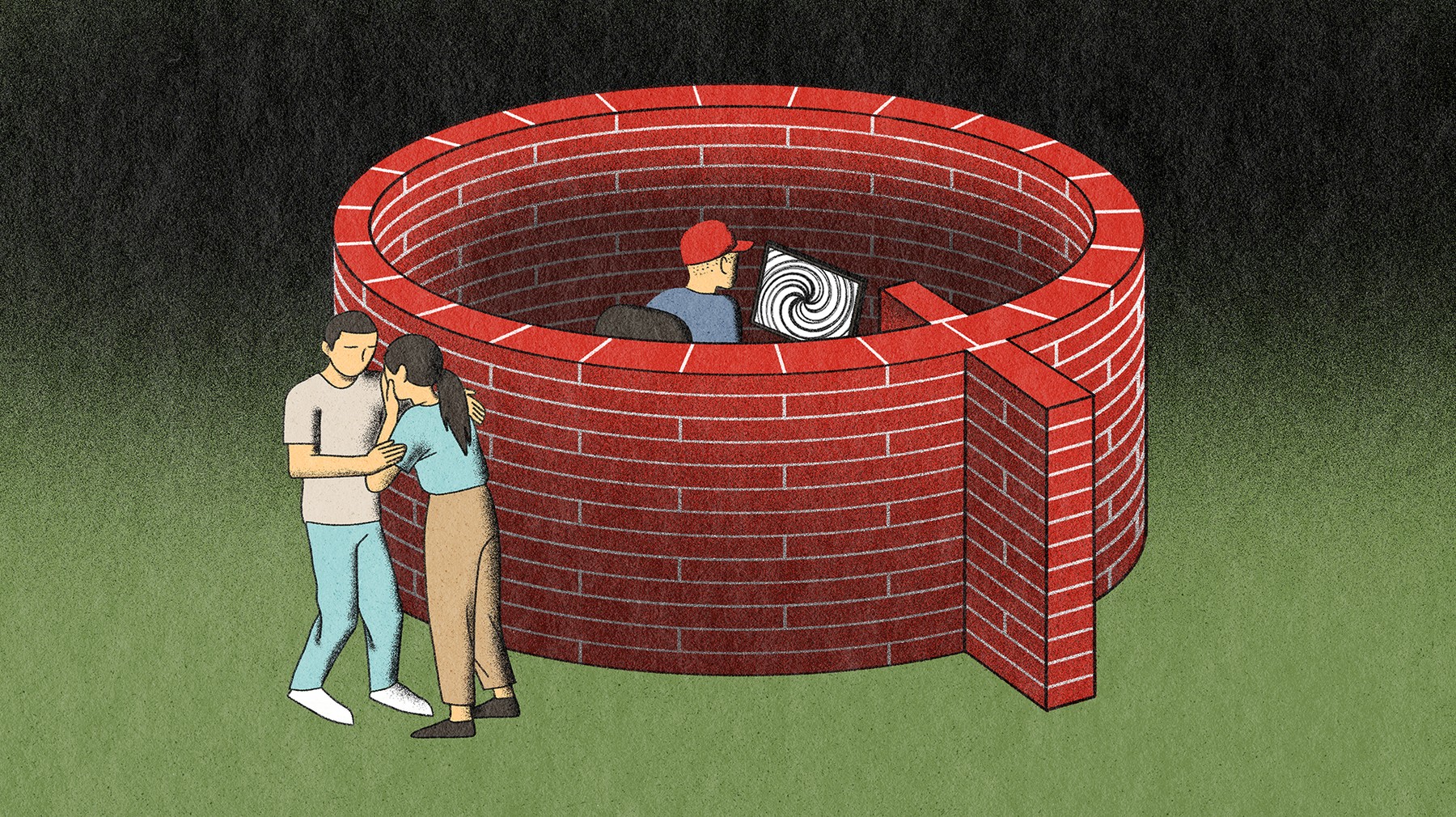How QAnon Is Tearing Families Apart
VICE News talked to dozens of people whose lives have been affected by QAnon and found that there is no such thing as a typical Q follower.
QAnon emerged from the toxic fever swamp of the 4chan message board in October 2017 when an anonymous user calling themself Q Clearance Patriot posted the first of almost 5,000 so-called "Q drops," which have become a sort of foundational text for the movement. The name QAnon came from a combination of Q and anon, which is what the anonymous posters on 4chan call themselves.
The central thesis of the conspiracy is that there is a group of elites running a cannibalistic, satanic, child sex-trafficking ring being facilitated by the “deep state” and that Trump is waging a secret war to expose it all, which will culminate in an event known as "the storm."
Over the years, as QAnon made its way from 4chan to 8chan and then to Reddit and other fringe sites before exploding onto mainstream platforms in 2020, the conspiracy morphed and expanded to include more-extreme conspiracies dreamed up by believers, rather than coming from Q directly.
These include the belief that John F. Kennedy Jr. is still alive and will return as Trump’s vice president, and the
frazzledrip conspiracy, which falsely asserts that Hillary Clinton was caught on video raping and torturing a young girl before drinking her blood.
There is nothing new in QAnon. The core conspiracy it peddles is an anti-Semitic trope that dates to the Middle Ages and can be found in
the Protocols of the Elders of Zion, a pamphlet written by Russian propagandists in 1902 that claimed a group of Jews was plotting to take over the world. Central to this was the blood libel, the claim that these Jews were kidnapping Christian children to slaughter them, drain their blood, and mix it with the dough for matzos consumed on Passover. The pamphlet was used as a propaganda tool by everyone from Henry Ford to Adolf Hitler, and it’s been repackaged once again by QAnon.
Speaking to family members of QAnon victims across the country, it’s clear that QAnon is not an easy conspiracy to categorize. Some people spoke of loved ones who openly boasted of their loyalty to Q and their belief in every single conspiracy associated with the movement. Others said they didn’t even know if their family members had heard of QAnon, and yet they repeated verbatim the core conspiracies pushed by the group’s followers.
What’s common to all of those who spoke to VICE News is that they see QAnon as a malign force that has radicalized their loved ones to the point where relationships have broken down, families have been divided, and people are living in fear for their safety.
Long before Mark walked in the door of their Chicago home one day last year carrying a machete, Elena knew that their 20-year marriage was coming to an end, thanks to QAnon.
It all began with 9/11 conspiracy videos on YouTube.
“I knew he was prone to get hyper-focused on something, and it would consume him for a time before he would lose interest," she said. "At first, it was the stock market, then video games, but then he started looking at the 9/11 footage on YouTube, especially the videos that claimed it was a setup, and that the towers and buildings nearby were purposely demolished.”
Mark’s focus then shifted to listening to Alex Jones' “Infowars” and watching Fox News “because he was obsessed with ‘finding the truth’ and would nightly spew this rhetoric at me. He would get frustrated because I just wouldn't buy into it.”
“He believed the numerous school shootings and the Boston [Marathon] bombing were faked, pulled off by crisis actors,” Elena said. “When I told him one of my co-workers had a friend who was injured at the bombing in Boston, he said my co-worker wasn't trustworthy and I shouldn't believe anything he said.”
Subsequently it was Donald Trump’s Twitter feed, Obama conspiracies, Hillary Clinton’s emails, and, ultimately, QAnon, which is where everything finally fell into place for Mark
“I don't know how he found QAnon, or 4chan, but to him, it was the place where everything made sense, and he met like-minded people who reinforced the conspiracies,” Elena said.
Mark has a master's degree in economics, served four years in the military, and works in healthcare. He might not strike you as a stereotypical QAnon follower. There are no stereotypical QAnon followers. They are artists. They are young and old and middle-aged. They are brothers, sisters, husbands, wives, fathers, and mothers; they are grandparents; they are sons and daughters. They are highly educated and barely educated. They are tech-savvy and they are digitally illiterate. They are pastors preaching from the pulpit. They are from all corners of the United States—and, increasingly, outside it. They are Republicans and Democrats. They were Bernie supporters and Obama supporters. They are business owners and elementary school teachers; they are professors and construction workers; they are IT directors and former FBI agents; and they work for the White House.
And yet despite all this diversity, there are some common threads, based on conversations with dozens of family members of QAnon followers who spoke to VICE News about the damage the conspiracy is doing to their loved ones.
Christian evangelicalism appears to be a major gateway to QAnon belief, with many of those VICE News spoke to reporting that their family member’s belief in the conspiracy theory was tightly integrated with their faith. The majority of the QAnon believers we spoke about were in their 50s, 60s, or 70s. The vast majority were white, and over half did not identify as QAnon supporters—even as they spouted, verbatim, the conspiracy theories boosted by QAnon.
The pandemic has clearly played an important role in radicalizing many people, especially older people who’ve found themselves isolated and without any real human contact as a result of lockdowns. While the majority have come to QAnon from a right-wing political viewpoint, a significant number have been radicalized through wellness and spirituality communities online.
All of those we spoke to said their family members were informed about the conspiracy through mainstream social media sites like Facebook, YouTube, and Twitter. Some have now moved on to more fringe sites like Gab and Telegram, but most still use the mainstream sites as a way of communicating with fellow QAnon believers.
https://www.vice.com/en/article/dy8...milies-apart?utm_source=pocket-newtab-intl-en
There's more in the article, click to read the entire thing. Its too long to be posted here.


 I thankfully would barely know where to look. It's very interesting though as I'm not sure if Q would stop after Trump lost. I mean the people that run Q do it for the monetary gain only in my opinion, they are swindlers but I guess if you have managed to find such a good devoted income source then why stop, especially if your customers are still so devoted to you. I don't for a second believe that the authors behind Q believe this shit. They may well be right wingers but for me it was initially a bit of a troll thing and then they realised that they could make money off it. Funnily enough not so different from the 'rigged election' money grift that Trump pulled. Hell maybe the Trump organisation is behind it so they can bleed more money from the supporters. Now there's a theory.
I thankfully would barely know where to look. It's very interesting though as I'm not sure if Q would stop after Trump lost. I mean the people that run Q do it for the monetary gain only in my opinion, they are swindlers but I guess if you have managed to find such a good devoted income source then why stop, especially if your customers are still so devoted to you. I don't for a second believe that the authors behind Q believe this shit. They may well be right wingers but for me it was initially a bit of a troll thing and then they realised that they could make money off it. Funnily enough not so different from the 'rigged election' money grift that Trump pulled. Hell maybe the Trump organisation is behind it so they can bleed more money from the supporters. Now there's a theory.